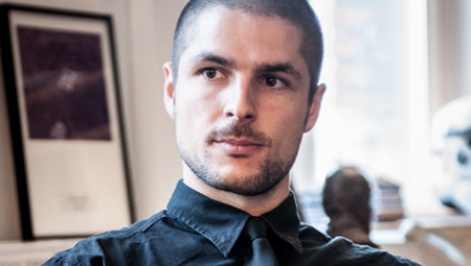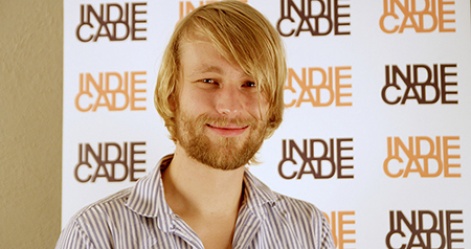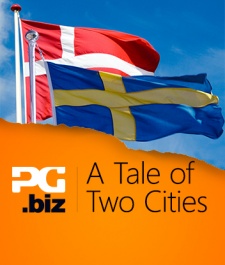This is the fourth part in a week long look at mobile development in the cities of Malmö and Copenhagen.
Having got to grips with the big-meets-smalldevelopment scene in Malmö, Sweden, now's the time to cross the Øresund Bridge to the Danish capital, Copenhagen, for a scan of the state of play there.
Lucky, then, that two of the cities luminaries - Dino Patti, CEO and co-founder of the studio behind Limbo Playdead, and Lau Korsgaard, the creative director of Knapnok Games and vice president of the Copenhagen Game Collective were on hand to give us their take.
Not that Copenhagen has always been known as a mobile powerhouse. Traditionally, the city's development community is perhaps most famous for console titles, with IO Interactive the outfit behind the Hitman franchise one of the Danish development scene's most prominent players.
But that's slowly changing. Indie studio Playdead released Limbo to massive critical acclaim and financial success first on Xbox Live Arcade, before porting to mobile devices.
Patti, the firm's CEO, suggests that the industry's shift to mobile has resulted in some difficulties for Copenhagen's larger studios that have ended up benefiting the wider gaming scene.
"I definitely think the scene has grown," says Patti. "As IO and some of the other bigger Danish game companies have downsized a lot of small indie groups and companies have gotten a foothold here."
Platform player
Playdead is right at the frontlines of Copenhagen's growing indie scene, but that growth relies on those a the top of the tree offering up knowledge and advice to those at the bottom. Is that happening?
"To be honest we are not that active in the community," Patti tells us.
"I have a deep belief that you shouldn't shove advice down people's necks, but we are actually happy to give advice if people ask for it. Arnt Jensen [Playdead co-founder] and I have for a long time talked about how to support a community in our own way, but haven't come to a place yet where our resources allows us to do so."
One area where many would no doubt like Playdead's take is when it comes to selecting platforms. The studio has released Limbo on pretty much every system out there and, as a result, has worked with the major platform holders.
"We have a great relationship to [Sony and Microsoft], and I think both companies have always treated us with respect," Patti tells us.
"As for their approach towards indies, I think both have recognized that the indie community, both in terms of developers and the people which play the games, are a huge part in creating success for their respective platforms."
Dino Patti
The most important thing Patti argues, is to choose the right release platform for you, rather than chasing the hot new thing.
"You should just pick the platform that suits your game the best. Gold rushes are lead by a belief in getting rich very fast, and I think that in itself is a wrong motivation in the games industry."

'Loose network'
When it comes to advice, The Copenhagen Game Collective is something of a local staple.
The body exists as a small group of ten local game developers, software developers and researchers dedicated to raising the profile of the city's games industry. That might sound like not enough people to take on such a complex task, but the Collective has had great success in merging games with other art forms at exhibitions and other events.
As well as serving as creative director at Knapnok Games, Lau Korsgaard also acts as vice president of the Collective.
"It is a loose network of creative individuals in Copenhagen that likes to run events, exhibitions and throw parties around experimental independent games," Korsgaard tells us.
"The stuff we are doing in the Collective is more focused on reaching out to communities outside games, to reach out to non-gamer people and art institutions, festivals and so on. We're working on larger cultural recognition for games and for collaborations between games and other artistic mediums.
"We want to explore not just independent ownership of your own company but also really alternative and experimental games which are not normally seen in the mainstream."
The nature of the Collective's work means that Korsgaard has to keep a very open mind about what exactly constitutes an indie game, an experimental game and even games in general.
He and his colleagues are more concerned with indie as a community, rather than a definitive label for individual studios.
Lau Korsgaard
"There is no mathematical or economic definition of what indie is. It's more like a collection of different scenes. It's more like if you feel like you're indie and people recognise you for it then you are making indie games. I don't mind that the term is fluffy and weird," Korsgaard says.
"There is not one big indie scene, but a lot of small ones. There is a scene in Copenhagen, one around the jigsaw community, around New York with physical games. There are both online and local scenes of developers getting together and making interesting games. I don't need a clear definition."
One of the keys to the Game Collective's success so far and the wider health of the Danish gaming community is game jams.

These events see hundreds of developers getting together to produce micro games in a very short time period, often as little as 24 hours. The Game Collective is naturally keen to take some of the responsibility for the success of game jams in Copenhagen.
"One of the things that is really big in Copenhagen is that there is a vibrant game jam scene. It's not all because of the Copenhagen Game Collective but we are a part of that," Korsgaard claims.
"There is a thing called Nordic Game Jam which is one of the largest in the world with something like 300 people attending. Game jams are something we love."
Party people
Of course, if Korsgaard and his colleagues are going to gain greater recognition for experimental games, then then need to come up with some experimental promotional ideas as well.
One of the Collective's most remarkable so far was a club night with a gaming twist, which managed to attract the great and the good of Copenhagen's artistic communities in addition to its games industry.
"We threw a party at a museum with a nightclub feel but on top of the DJ and the VJ we had a Game J, a GJ," Korsgaard tell us.
"We mixed physical party games with the dance and visualisations alongside an exhibition space. Getting these events into the established art community changes some people's opinions about what games do and what games are."
Another key aspect of Copenhagen Game Collective, is communication with the games industry across the Øresund Bridge in Malmö, Sweden.
When we've spoken to Swedish games studios this week, they've been concerned that there is not enough of a relationship between the games companies in the two cities divided by the bridge. Korsgaard, however, believes that there are already opportunities aplenty for the two communities to get together, even if the Collective's own attempts at organising joint events with Malmö has been less than successful so far.
"There is a lot of connection with Malmö and Sweden in general. We are trying to throw some events where devs from both cities show stuff and drink beers together but it has been hard to get rolling," Korsgaard claims.
"We do go to each other's game jams and events though. A lot of people from Sweden come to the Nordic Game Jam in Copenhagen every year. There is a also a cool game jam in Sweden called No More Sweden which gets invaded by developers from Copenhagen. My studio has been working with a Swedish studio to do our art and graphics too."
The one event which really ties Denmark and Sweden together in a gaming sense is the Nordic Game Conference, organised by the Nordic Game Program. However, the price of entry to this prestigious event can prevent many smaller developers from attending.
The Copenhagen Game Collective now works with the organisers to host a free pre-conference event that is free to attend and it has been growing rapidly.
"Last year we did a full pre-conference for a half day before the actual conference started. It was free so that students and everyone that can't pay the big ticket for the full conference can come and we had interesting talks," says Korsgaard.
"We really like to throw parties in different places! There were 300 or 400 hundred people at our pre-conference last year. Until last year it was just a party but we wanted to extend it with actual talks. It was a really huge success.
"There's a big need for people to have events where they can meet up."
Tomorrow we will complete our week or interviews by speaking to Per Strömbäck, spokesperson for the Swedish Games Industry, to gain some deeper insight into the relationships between Copenhagen and Malmö.





















